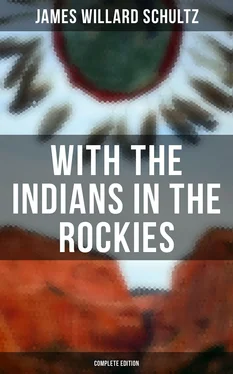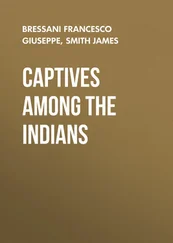By the channel it was called eight hundred miles from Fort Union to Fort Benton, where we hoped to arrive in two months. After the first day's experience, I thought that we should be fortunate if we reached the place in two years. From morning until night the cordelliers toiled as I had never seen men toil before. It was a painful sight, those thirty men tugging on the long tow-rope as they floundered through water often waist-deep; through quicksand or mud so tenacious that the more unfortunate were dragged out of it gasping for breath and smeared with the stuff from head to foot. They frequently lost their footing on steep places and rolled down into deep water; banks of earth caved upon them; they were scratched and torn by rose-brush and bull-berry thorns; they were obliged to cut trails along the top of the banks in places, and to clear a way for the boat through dense masses of sawyers and driftwood.
A day or two after leaving Fort Union we narrowly escaped losing the boat, and the lives of all of us who were on it, in the treacherous swirling current. At the time the cordelliers were walking easily along a sandy shore under a high bank. Ahead of them, at the edge of the water, lay a dead buffalo bull, its rump partly eaten by the prowling animals. When the lead-man was within a few feet of it a big grizzly sprang toward him from the other side of the carcass, where it had lain asleep. The men dropped the rope and with loud cries sprang into the water, since they could not climb the bank. The boat at once turned broadside to the swift current, drifted against two sawyers, and began to turn turtle. The lower rail was already under water, and the horse had lost its footing and tumbled overboard, where it hung strangling, when by the greatest good fortune first one and then the other of the sawyers snapped under the strain, and the boat righted and swung in to the bank. We now had time to see what was going on above. The bear was just leaving the opposite shore and making for the timber; the men, dripping from their hasty bath, were gathered in a close group near the carcass, and were talking and gesticulating as only Frenchmen can. We suspected that something was wrong, and while the bowmen made the boat fast, the rest of us hurried up the shore. The group parted at our approach and disclosed one of their number—the lead-man on the rope—lying moaning on the sand. The bear had overtaken and mauled him terribly, and then, frightened probably by the loud cries of so many men, it took to the river and swam away. We got the wounded man aboard at once, and my uncle set his arm and made him as comfortable as possible. The hunter had saved his horse by cutting its rope and swimming with it to a landing far down stream. As soon as the tow-line was recovered we went on, thankful that the accident had been no worse.
Yet through it all they were cheerful and happy, and at the evening camp-fire my uncle was frequently obliged to speak harshly to keep them from shouting their voyageur songs, that might have brought some prowling war party of Indians down on us. The food of these men was meat—nothing but meat, washed down with a little tea. Sometimes they managed to dig a few pommes blanches , white, edible roots that were very palatable when roasted in the coals. Uncle Wesley and I had a box of hard crackers and a few pounds of flour and sugar. When they were gone, he told me, we should have no more until we sat down to our Christmas dinner. That did not worry me; I thought that if big, strong men could live on meat, a boy could, too.
The river wound like a snake through the great valley. There were long points only a mile or two across by land, but many times that distance round by the channel. Sometimes when we came to such a place Uncle Wesley and I would hunt across the bottom and then wait for the boat. On these trips I killed my first deer and elk and antelope—not to mention several more buffalo.
But Uncle Wesley was always uneasy when away from the boat; he was responsible for it and its cargo, which was worth more than a hundred thousand dollars in furs. Should anything happen to it while he was away from it, even for an hour's hunt, his hope of eventually becoming a member of the great company would have to be given up. Finally, after minute instructions in the proper handling of the rifle, I was allowed to accompany the hunter on his daily quests for meat.
Baptiste Rondin was a dreamy, gentle little Creole from Louisiana. He came from a good family, had not been taught to work, and had hated books, so he told me. So when misfortune came to his family, and he had to do something, he chose the position he now held in preference to others with more pay which the Chouteaus had offered him. When we started out in the morning, I would climb up behind him on the gentle old horse, and we would ride for miles up one side or the other of the river. We always saw various kinds of game soon after leaving the boat, but never attempted to kill any until some was found convenient to the shore of the river, where the boat could land and the meat easily be taken aboard.
Besides looking for game, we examined every dusty trail, every mudflat and sandbar, and constantly scanned the bottoms and the hills for signs of Indians. They were the great terror of the cordelliers; often a boat's crew was surprised and killed, or the cargo was destroyed.
We tied up one night four or five miles below the mouth of the Musselshell River, which my Uncle Wesley said Lewis and Clark had so named on account of the quantities of fossil shells that are found there.
Early the next morning Baptiste saddled the old horse, and we started out to hunt at the same time that the cordelliers hauled the rope tight and began their weary tramp.
We came to the lower edge of the big bottom at the mouth of the Musselshell. Opposite the mouth there was a heavily timbered island. One small band of antelope was the only game in sight between us and the Musselshell. On the other side of it, at the upper end of the bottom and close to the Missouri, there were a couple of hundred buffalo, some feeding, some lying down.
They were so far away that we rode boldly through the tall sage-brush to the little river, and across it to the outer edge of the strip of timber. There Baptiste told me to remain with the horse while he crept out to the herd and made a killing. I did not like being left alone. There were many fresh grizzly tracks on the river sands just behind me, and I was afraid of the terrible animals, so afraid that I did not dare to dismount and gather some strawberries which showed in the grass at the horse's feet.
The passing minutes seemed hours. The tall sage-brush out ahead had swallowed Baptiste. By rising in the stirrups I could just see the backs of some of the distant buffalo. A sudden splash in the river made my heart flutter, and I quickly turned to see what had caused it.
Here and there between the trees and brush its glistening surface was in plain view, and through one opening I saw something more terrible than a whole band of grizzlies: an Indian crossing toward me. I saw his face, painted red with blue bars across the cheeks; I noted that he wore leather clothing; that a shield hung suspended from his left arm; that in his right hand he grasped a bow and a few arrows.
All this I noted in an instant of time; and then nearer to me, and more to the right, a stick snapped, and I turned my head to see another Indian in the act of letting an arrow fly at me. I yelled and gave the horse such a thump with the stock of my rifle that he made a long, quick leap. That was a lucky thing for me. The arrow aimed at my body cut through my coat sleeve and gashed my left arm just above the elbow.
I yelled frantically for Baptiste and urged the horse on through the sage-brush. I looked back, and saw that Indians all up and down the stream were leaving the timber and running toward me. I looked ahead and saw the smoke of Baptiste's gun, heard the report, saw the buffalo bunch up and then scurry westward for the nearest hills.
Читать дальше












